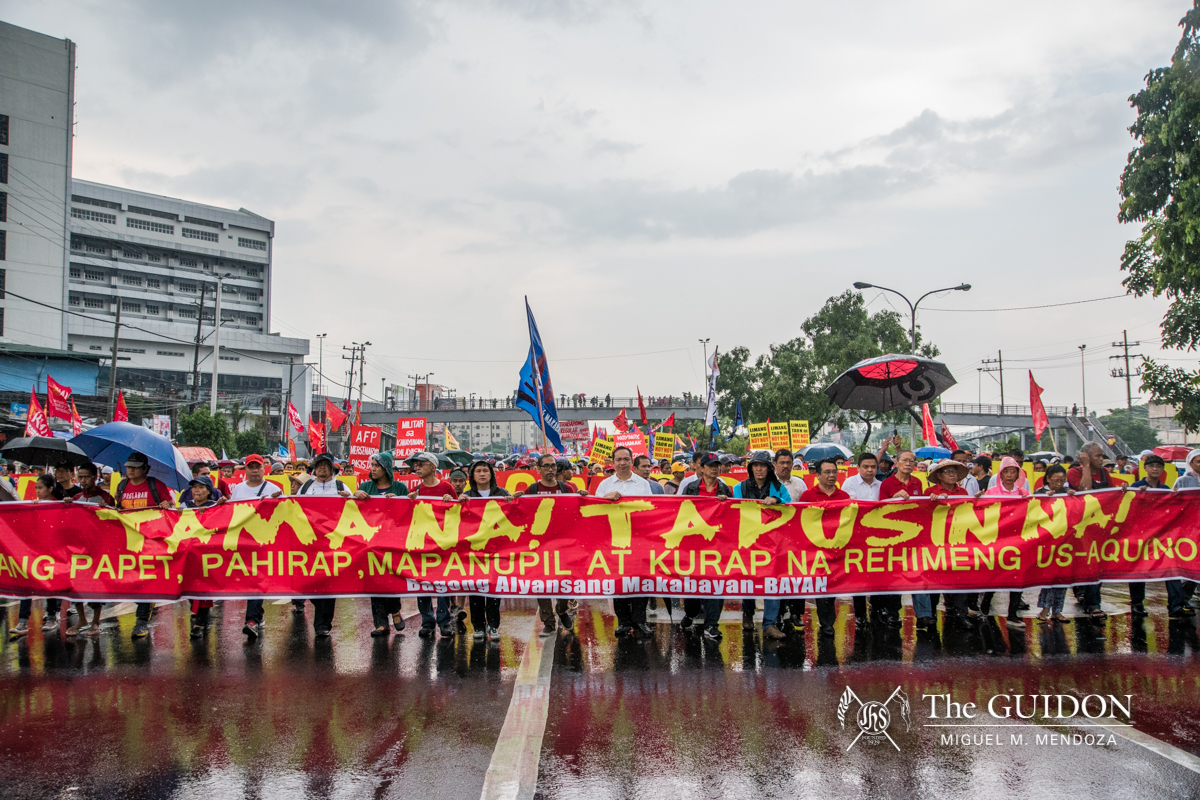UNDER AN overcast sky, militant groups from various sectors of civil society gathered on Commonwealth Avenue, Quezon City to stage a protest rally against President Benigno Aquino III as he delivered his sixth and final State of the Nation Address (SONA) last July 27.
Protesters from the labor, education, health, and youth sectors, among others, gave the Aquino administration a “failing mark,” as they voiced their own people’s SONA meters away from barbed barricades, behind which stood a phalanx of police deployed there for crowd control.
During the protesters’ program, Teddy Casiño of Bayan Muna asserted that Aquino’s “tuwid na daan” remains crooked.
“Ang tunay na mundo ng ordinaryong mamamayang Pilipino ang mundong ipinakikita natin dito sa lansangan sa hapong ito (In these streets on this afternoon, we show the true state of the Filipino people),” Casiño said, adding that Aquino was wont to airing “fantastical achievements” rather than talking about actual problems faced by citizens.
Some of these problems include cases in defense, education, and labor, among others.
Ties that bind
For Liza Maza, an activist from women’s group Gabriela, the country’s Visiting Forces Agreement and Enhanced Defense Cooperation Agreement (EDCA) with the United States (US) remain a problem.
Maza said that the Aquino government has continuously misled people by saying that such agreements are necessary to reinforce the country’s defense against China. The military cooperation is supposed to see the US come to the Philippines’ aid if armed attack, specifically from China, hits the country.
According to her, aid “is not guaranteed” under the EDCA. It would not serve the US’s interests to go at war with China as the countries “also collude, in away, because they have a big trade and business partnership,” she furthered.
More than a billion dollars of goods and services flow between the US and China daily—possible through the 40-year old US-China Business Council— a China Business Review article written in 2013 states. “More than 800,000 American jobs depend on producing goods and services sold to China,” the same article says.
Another concern that Maza brought up was the Trans-pacific Partnership (TPPA) Agreement, a trade agreement involving the US, China, Japan, Australia, Vietnam, Brunei Darussalam, New Zealand, Singapore, Peru, Canada, Chile, Malaysia, and Mexico. Aquino welcomed the idea of a Charter change in his term in order to qualify for this agreement, Maza said.
A recent article on Newsweek explains that the agreement seeks to lift tariffs from US goods and services in TPP partner countries, a setup that would largely benefit US companies. Other than that, much of the negotiations remain clandestine, adds Newsweek.
Maza said that it is imperative for the next president to voice his or her clear stand on the TPPA, which she considers a “colonization agreement.”
Education woes
At the same rally, groups such as the Alliance of Concerned Teachers (ACT) expressed dismay over Aquino’s educational policies.
Vice-President of the Quezon City Public School Teacher’s Association Mabelle Caboboy said that public school teachers receive salaries insufficient to their level of work.
“The government tells us we are being paid according to the national minimum wage, but let me tell you how teachers work overtime, even bringing their work to their houses checking tests or reports,” she said in Filipino.
ACT also blasted the K-12 program, Aquino’s foundational educational program.
According to Caboboy, the current educational system is not yet prepared for the shift to the K-12 system, as much as Aquino pushes for its full implementation.
Aquino signed into law the program institutionalizing the K-12 program last 2013, and is expected to be fully implemented by 2016.
Another member from ACT accused the government of deliberately designing its educational curriculum to produce unskilled workers to be used for cheap, exportable labor.
Labor struggles
Moreover, local labor unions such as Kilusang Mayo Uno (KMU) as well as Overseas Filipino Worker groups such as Migrante criticized Aquino’s handling of the country’s labor issues.
Migrante Partylist chairperson Connie Bragas-Regalado said that Aquino has been unable to push for jobs for Filipinos and has thus facilitated an exodus of labor from the country.
“In the SONA, President Aquino will brag about how many people he was able to deploy to other countries. This simply proves that he was unable to provide gainful employment for Filipinos in the country,” she said in Filipino.
According to KMU Secretary-General Roger Soluta, the President has implemented a series of economic policies that has resulted in the dominance of capitalists in the country.
He explained further that Aquino’s policies of liberalization, privatization, and deregulation has provided for an exploitation of Filipino workers.
“Itong si Noynoy, talagang kontra-manggagawa, kontra-mamamayan, at maka-kapitalista, tuta ng mga imperialista (President Aquino is anti-worker, against the people, and pro-capitalist. He is a puppet of the imperialists),” he said.
Things unsaid
In a hall in the Batasang Pambansa, not very far from the protesters’ stage, President Aquino gave his final SONA. In this final address, the president slammed the corruption of former President Gloria Macapagal-Arroyo, concluding, “Ang makalimot sa mali ng nakaraan, garantisadong uulitin ito (Those who forget the mistakes of the past will surely repeat them).”
Aquino also lauded his Cabinet, recognizing their contributions to his daang matuwid.
There were also issues he did not mention, however, and these include the Mamasapano incident in late January, the Freedom of Information Bill, reproductive health, and the status of Yolanda recovery nearly two years after the tragedy.
“Sa gabay ng Panginoong Maykapal, at sa patuloy nating pagtahak sa Daang Matuwid, lalo pang tatayog ang mga pangarap na maaabot natin. Lalo pang lalawak ang kaunlarang tinatamasa natin. Nasasainyo pong mga kamay ang direksiyon natin (With the Lord’s guidance, and with our continuous pursuit of the straight path, we could achieve even bigger dreams. Our growth could also widen. Our country’s direction is in [the citizens’] hands),” Aquino concluded.
All the while, dissatisfied militants voiced what they believe to be the nation’s actual state, one fraught with corruption, imperialism, and time that is running out.




